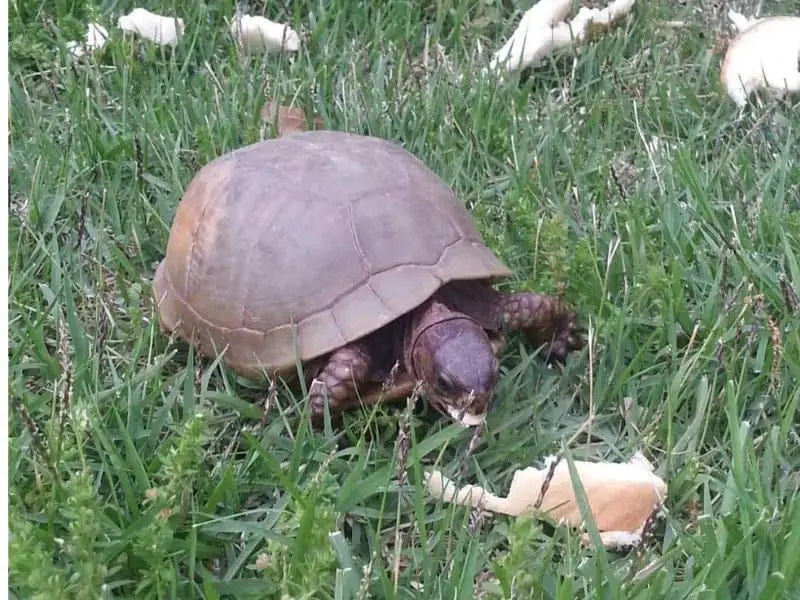Turtles will eat anything you give them. However, for many reasons, bread should not be included in a turtle’s diet. Firstly, turtles lack the enzymes necessary to digest bread. Besides, yeast makes bread harmful. So if you insist on giving your turtle bread, know that you’re not adding any nutrients to its diet. Instead, you’re increasing the chances of indigestion because of the ingredients found in bread.
Bread might not seem harmful, as many humans consider wheat a healthy grain. However, on the flip side, bread has dairy and sugar. Such ingredients make bread hard for a turtle’s system to digest due to its slow metabolic rate. In addition, you cannot control the amount of preservatives companies add to commercial bread.
Can you feed turtles bread?

Turtles are omnivores. Still, that does not mean they should eat bread. Even though most turtles eat bread when you give it to them, it’s not a good idea to do so. If you incorporate bread into the diet and offer it in small amounts, it won’t cause much harm. However, it beats logic because bread has zero nutritional benefits for turtles. Bread is only calorie-packed.
Wheat is nutritional, but not for turtles. Turtle owners might find it easy to offer bread to their pets because it’s readily available and easy to chop up. According to experts, the following reasons should bar you from feeding bread to your pet turtle:
Indigestibility
Turtles’ digestive systems lack the enzymes needed to digest bread. It contains sugar and dairy, making the lactose in the milk impossible for turtles to digest. As a result, your pet can have serious digestion issues.
A lack of nutritional value
It is highly recommended to feed turtles species-appropriate food. Unfortunately, bread does not fall in that category. Your turtle lacks many nutrients, such as calcium, and suffers from deficiency diseases if it constantly feeds on bread. One of the most common is metabolic bone disease.
Risk of choking
Suppose you offer bread to your turtle while in the water; it won’t choke. However, some pet owners offer dry bread as a treat, which is risky. Bread that is not cut into small pieces is hard to swallow. Thus, your turtle might get choked in the process.
When turtles eat bread, especially over a long period, they refuse to eat other nutritious foods. Bread is an easy meal to ingest, especially when soaked in water. However, some compounds in bread prevent the turtle’s system from taking in beneficial nutrients. With time, your turtle becomes malnourished and might experience the following:
- Indigestion issues
- Shell malformation due to lack of calcium
- Decline in health
- Obesity in domesticated turtles due to high-calorie intake and lack of enough exercise
Can turtles digest bread?
Most turtles will eat bread if it is provided. As a pet owner, you want to give foods that benefit your turtle. Bread is off the list since turtles cannot digest it. Sugar and dairy are major ingredients in commercial bread. Even if you make it whole grain, the impact is similar.
Dairy products contain lactose. While turtles can digest more complicated foods, lactose isn’t one of them. Their bodies do not produce the enzymes necessary to digest and break down lactose. Therefore, eating bread leads to indigestion issues.
With that said, bread must be kept off a turtle’s diet because of the many negative effects. Although some pet owners think breaking it into breadcrumbs makes it better, veterinarians strongly advise against it. Furthermore, since indigestibility results from eating bread, it’s best to avoid it altogether.
Is bread toxic to turtles?
We’ve established that feeding turtles bread is a bad idea. It is non-nutritious and hard to digest for your turtle’s system. On top of that, giving bread often leads the turtle to refuse other beneficial foods. No type of bread is better than another. As humans, whole grain bread seems healthier. However, all types of bread are unsuitable for turtles.
Mouldy or spoilt bread still contains the same ingredients as fresh bread. So, it makes no difference and will hurt your turtle in the long run. Still, if you feel that you must give bread to your pet turtle, avoid bleached commercial bread.
The dangers of giving turtles any bread include:
- Malnutrition
- Digestion issues
- Health issues such as metabolic bone disease
- Risks of choking
Once a turtle gets used to eating bread, it refuses to have other nutritious meals. Yes, bread is easy to prepare. So, you might be tempted to give it to your pet as a meal or snack. However, the effects will be noticeable within no time.
Bread lacks calcium, which is crucial in a turtle’s diet. Calcium is available in the recommended amount in fruits and vegetables. Also, turtle-specific foods like pellets are packed with nutrients, which bread lacks. Thus, it is safe to say that bread is toxic to turtles.
Nutritional facts about bread
Bread is a staple worldwide. While it may not benefit turtles, it is not as harmful to humans and some pets. However, bread is not the best choice if you’re going for a healthy snack or food choice. Bread is relatively deficient in essential nutrients. Thus, you’d do yourself a favor to stick to other foods. Fruits and vegetables contain the many nutrients lacking in bread.
If you want to stay fit, know that bread is high in calories and carbohydrates. On the other hand, it does not provide enough of the following:
- Protein
- Fiber
- Fat
- Minerals
- Vitamins
Below is a breakdown of the nutritional facts of bread:
| Whole-grain bread (33 grams per slice) | White or bleached bread (25 grams per slice) | |
| Calories | 92 | 67 |
| Fiber | 2 | 0.6 |
| Fat | 2 | 1 |
| Protein | 3 | 2 |
| Carbohydrates | 17 | 13 |
Alternatives to bread for turtles
When it comes to feeding your turtle, focus on nutrient-rich foods. Also, turtles are omnivores. So, offering a balanced diet with meats, fruits, and vegetables is crucial. Undoubtedly, it would help if you scrap bread off a turtle’s diet. Instead, offer the following to ensure your turtle grows healthy and happy:
- Insects
Turtles are fond of eating insects. Moreover, insects have high protein and vitamin content. Turtles catch insects in the wild themselves, but freeze-dried insects are available for pet turtles in local pet stores. There is no harm if you feed your turtle insects daily for some meals. The amount of insects to offer depends on the turtle’s age.
- Shrimp
Pet owners should strive to mimic a turtle’s wild diet. Dried shrimp are an excellent source of protein and healthy fats. In addition, shrimp contains various minerals and vitamins. Unfortunately, some fats derived from shrimp are lacking in some pet foods. So, supplementing your turtle’s diet with dried shrimp makes the diet more nutritious. Add a few pieces of shrimp to the tank as a meal or snack. Break large pieces of shrimp into half for your younger turtles to prevent choking.
- Vegetables and fruits
Turtles benefit greatly from eating fruits and vegetables. Offer options such as blueberries, apples, and lettuce. These are packed with vitamins and minerals. Moreover, they are a great healthy treat instead of giving bread to turtles. The fruit portions must be in tiny bite-size pieces without seeds. There’s no harm in giving fruits and vegetables daily as a treat or as a meal.
- Worms and live food
Worms are highly nutritious for turtles. They contain protein, amino acids, and iron. Your baby turtle will benefit more from eating worms due to their high protein content. So, offer worms as a daily meal, especially in the morning when they are most active. Also, incorporate live food like feeder fish once a week to enhance your turtle’s natural hunting instinct.
- Meat
Only give cooked pieces of meat to turtles. Meat has a high protein content, boosting muscle and skeletal growth. Younger turtles eat smaller meat pieces. However, adult turtles enjoy breaking the meat apart with their teeth. Older turtles need less protein since they are grown to full size. Therefore, offer smaller portions about once or twice weekly.
List of other human foods that turtles eat
You can enjoy the following foods with your turtle without worrying about harming your pet:
| Canned fish | Bananas |
| Eggs | Fresh fish |
| Carrots | Squash |
| Peas | Zucchini |
| Corn | Collard greens |
References
- K. Knipper. (2002). Chrysemys picta, Painted Turtle. BioKids.
- H. Gregory (2020). Turtles of Missouri. Washington University in St. Louis.
